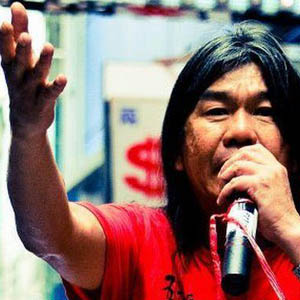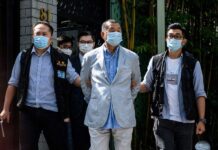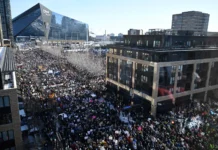Prepare now for mass struggle – a socialist alternative is needed
Dikang, Socialist Action
Hong Kong’s Legislative Council elections on September 9 take place against the backdrop of an unprecedented political crisis. Hundreds of thousands of ordinary people have shown their anger at the current state of affairs, joining huge demonstrations on June 4 (Tiananmen vigil), June 10 (protest at death of Li Wangyang), July 1 (annual democracy protest) and July 29 (against school brainwashing plan).
As this article will explain, Socialist Action is campaigning in support of ‘Long Hair’ Leung Kwok-hung and the League of Social Democrats (LSD) in the elections. As a relatively new force, Socialist Action is unable – due to the excessive cost – to put up a candidate of our own for the Legco this time around. But just like last year’s district council elections, when Socialist Action did stand a candidate, our aim is not only to win votes, but also to raise political consciousness, build support for socialism and recruit new activists. We call for a vote for the LSD as the most radical alternative in these elections. A good result for the LSD and other so-called ‘radical’ candidates will lay the best ground for the coming struggles against C.Y’s government. But we also stress the need for a socialist alternative. A vote on September 9 is only the first step. To create a powerful socialist alternative we call on workers and youth to join Socialist Action and get active in the struggle.
Crisis government
Growing numbers in Hong Kong are being politicised. A combination of factors are behind this: the scandalous antics of an increasingly corrupt capitalist establishment, a ‘democratisation process’ stuck in reverse, and the most extreme wealth gap of any Asian economy. The imposition by the CCP dictatorship of Leung Chun-ying (C.Y.) as chief executive, in the most farcical of rigged elections, has only served to fan the flames of popular discontent.
Rather than the customary political honeymoon enjoyed by most new governments, C.Y’s regime has been plunged into immediate crisis, hit by three ministerial scandals in its first five weeks. After what most commentators have called a “bad start” – referring to the 400,000 demonstrators demanding his resignation on day one, Leung has accomplished the almost impossible feat of making his defeated opponent, the disaster-prone Henry Tang Ying-yen, look a safer choice from the standpoint of Beijing’s puppet-masters.
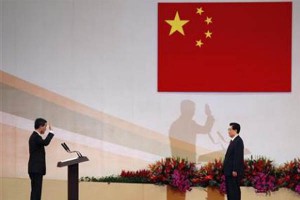
As the South China Morning Post reported (21 July 2012) rumours are even circulating of a ‘Plan B’ among Beijing’s strategists to replace C.Y. just as Tung Chee-hwa was retired through “ill health” in 2005. This is not the most likely short-term perspective, as it would also involve a major loss of face for the CCP regime, but it cannot be excluded further down the line. With the situation in China becoming more and more unstable, the dictatorship above all wants “stability” in Hong Kong, something that C.Y. is unlikely to deliver.
According to media reports even government insiders have taken to describing the new administration as an “overheated kitchen”. C.Y. not only faces a massive public backlash over his government’s national education plan, but is feeding even greater anger through his habit of appointing crooks, cheats and liars to top positions. It would appear the government is competing for ‘Olympic gold’ in ministerial resignations. Former development secretary Mak Chai-kwong lasted just 12 days, before being arrested for fraud involving housing allowances. His replacement, Paul Chan Mo-po, triggered immediate scandal when exposed as a rack-renting landlord of tiny subdivided cubicles. His attempted cover up fell apart within days. With Chan’s position hanging in the balance, fiasco is the only fitting description.
Housing crisis
What adds to the incendiary nature of these scandals is that they all involve the property sector. This sector – ruled by an unelected dictatorship of tycoons and speculators – has become sheer misery for big layers not just of the working class, but also growing sections of the middle class. Hong Kong has the most expensive house prices anywhere in the world, which have soared 80 per cent in the last three years. The Economist magazine’s (28 April 2012) own quarterly home-price index found Hong Kong property to be 58 percent above “fair value”, making it second only to Singapore as the most overvalued property market.
There is an urgent need for more public housing, at cheap rents, with 189,500 households currently on the waiting list. This figure understates the real extent of the housing crisis because at least 100,000 more people live in unsafe, unsanitary or temporary accommodation. At the same time, according to the admission of former chief executive Donald Tsang yam-kuen, Hong Kong has a staggering 228,000 empty apartments, mostly bought for the purpose of financial speculation.
Socialist Action calls for an independent investigation and the confiscation of such unoccupied properties – where there is evidence of speculation. We also call for an emergency plan to build 50,000 public rental apartments every year, which would necessitate the nationalisation of the property companies and banks under democratic public control as the only way to break the resistance of the money-grabbing tycoons.
C.Y. has attempted to win some popular support with a pledge to increase the rate of housing starts. He recently engaged in a largely rhetorical clash with tycoon Li Ka-shing, who opposes the relaunch of the government’s Housing Ownership Scheme (HOS), discontinued in 2002 under pressure from the tycoons. Evidently grateful to Li, whose obscene wealth and greed make him an easy political target, Leung tried to win some popularity points by stating the revival of the HOS is “inked in bold characters” in his government’s platform.
But if we look behind this phoney war, at the actual numbers, there is nothing “bold” about C.Y’s housing agenda. The planned restart of HOS projects will not take effect until 2016 or 2017 “at the earliest”, to quote housing secretary Anthony Cheung Bing-leung, and then at the extremely modest rate of 5,000 units per year. For those in the most pressing situation, the revival of HOS will not make any difference, as it involves subsidised housing for sale rather than for rent. Low income households are shut out of this sector, and therefore a huge increase in rented public housing is needed – an area where C.Y’s policies do not radically differ from the old administration.
Wealth gap
Closely related to the housing nightmare is the impoverishment of growing layers. The average household income of the poorest one-tenth of the population fell to HK$2,170 ($280) per month in 2011 from HK$2,590 in 2001.
A recent government census report acknowledged that inequality now stands at its worst level since records began in 1971. At the same time, workers are forced to work longer hours. Figures from the Census and Statistics Department show that around 620,000 people now work more than 60 hours a week, an increase from 440,000 in 1997. This is mainly due to the explosive growth of hired contract staff, replacing permanent employees.
C.Y. has taken some small measures such as doubling the old age allowance to HK$2,200 a month, at a cost of around HK$5.2 billion a year, when the government’s accumulated surpluses exceed HK$600 billion! He wants to sprinkle a little ‘sugar’ to disguise the poisonous wave of anti-democratic policies that his administration is preparing. But what is striking is how little new spending the government is offering, given its massive popularity deficit – and this during an election period!
Who is blocking democracy?
The struggle for democracy in Hong Kong is interlinked with these huge and growing social problems. For nearly three decades the capitalist establishment – first under British, then Chinese rule – has blocked the introduction of a ‘normal’ parliamentary system through a policy of delays, lies and manoeuvres.
According to its adherents, capitalism is one of Hong Kong’s so-called ‘core values’ along with free speech and the rule of law. Under closer examination we see a glaring contradiction here. Not only are the capitalists and their politicians the biggest lawbreakers in Hong Kong today, as the corruption scandals show; they also oppose an expansion of democratic rights. Many people, including the leaders of the main pan-democratic parties, wrongly identify the Chinese regime as the only force opposing genuine universal suffrage.
As an authoritarian regime, the CCP’s opposition to democratic rights is clear – but it is not alone in this. Billionaires like Li Ka-shing and other tycoons, who are well integrated into the Chinese governmental apparatus (NPC and CPPCC etc.), are also vocal supporters of Article 23 and other measures that restrict democratic rights. The capitalist elite in Hong Kong is steeped in anti-democratic sentiment, fearing ‘welfarism’ and encroachment upon its fantastic privileges should the masses win greater influence over government policy.
Looking back in history, when the young capitalist class in England, France and America fought for an expansion of democratic rights, this was part of a revolutionary struggle against feudalism and absolutist monarchies – a struggle for which the emerging capitalists needed to mobilise the broader population. Today too, revolutionary struggle is the only way to bring down authoritarian regimes.
But today’s capitalist classes, especially in Asia and wherever capitalism developed late and under the domination of foreign imperialism, are ambivalent and fearful towards such a struggle. Facing the need to attack the working masses, squeeze wages and increase workloads, they are generally wary of even the limited form of ‘democracy’ associated with capitalism in the West. Even in Western industrialised countries – as we have seen recently in Italy and Greece – governments consisting entirely of unelected ‘technocrats’ are being imposed by the banks and international capitalist agencies such as the EU over the heads of the voters in order to force through bitterly unpopular austerity policies.
This explains the symmetry of interests between the Hong Kong capitalists and the CCP dictatorship – brought together by fear of the potential power of the working class. It is impossible to fight one without also fighting the other. For this reason, those pan democratic parties that support the capitalist ‘free market’ claiming it is the economic system most conducive to democratic freedoms, are incapable of bringing about real democratic change. The ignominious slide of the ‘moderate’ pan democrats into rotten compromises and a quest for common ground with the authoritarian regime shows the political bankruptcy of these parties.
‘Super seats’ – a step towards democracy?
This Legco election is the first with the five so-called ‘super seats’ – functional constituencies corresponding to the five geographical constituencies in which all voters can vote. This innovation is being used by the establishment camp to sell the idea of ‘one-person-two-votes’ (one vote for the geographical constituencies and one for the ‘super’ functional constituencies) to a sceptical public who overwhelmingly favour outright abolition of the functional constituencies.
The five ‘super seats’ are just a decorative adornment, conjured up by the last administration in cahoots – shamefully – with the Democratic Party, to mask the deeply undemocratic nature of the functional constituencies. These are bastions of privilege and pro-regime reaction designed to ‘override’ the results of popular elections and guarantee establishment control over the Legco. The ‘super seats’ do not change this. Legislators for the remaining 30 functional constituencies are chosen by less than 2.5 percent of the population. In the previous Legco election, 14 of these seats were uncontested – with the bankers and property tycoons agreeing in advance who should represent their interests as a counterweight to that half of the Legco that is subject to popular pressure.
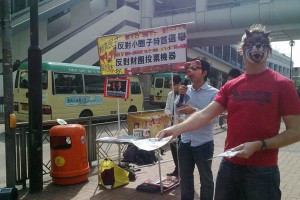
The last small-circle election for chief executive saw Beijing allow a contest to give the illusion of democratic progress (a tactic that backfired disastrously when the two establishment candidates became embroiled in a ‘civil war’). It was similarly envisaged that the election for the ‘super seats’ would generate a lot of ‘democratic’ noise while preserving the main core of the current undemocratic system. In reality, none of the ‘super seat’ contestants – who must be district councillors – represent a challenge or real alternative to the current system.
But just as the sham chief executive election span out of control, so too could the ‘super seat’ contest backfire on the pro-Beijing camp. Already, leading pro-government candidates are being forced to distance themselves from C.Y. over unpopular policies such as the school brainwashing plan. This led to an unprecedented intervention by Wang Guangya, Beijing’s top official for Hong Kong affairs, who on a visit to Shenzhen in July told pro-government parties, “Don’t attack the government to score political points in the election”.
These divisions do not reflect any genuine change of heart on the part of the diehard cynics of the pro-government camp, just electoral opportunism. But this situation nevertheless creates new difficulties and contradictions for the government, reinforces the crisis atmosphere, and could lead to the shipwreck of key policies such as the schools plan, especially if the teachers’ unions and other protest groups take full advantage of the splits in the establishment camp by escalating the struggle through strike action. In yet another sign of splits, top C.Y. supporter and campaign aide Lew Mon-hung, also a delegate to the Chinese People’s Political Consultative Conference (CPPCC), urged C.Y. to delay introduction of the national education curriculum.
Article 23
The battle against school brainwashing could become a ‘dress rehearsal’ for the even tougher battle against Article 23. A one-day school strike, the first such action since 1989, would shake the government to its core, especially if it took place just days before the Legco election. This would provide a new point of reference for the struggle to defeat Article 23, showing which methods of mass struggle are needed. It is clear that street marches alone are not enough. While they play a crucial role in raising consciousness and showing the scale of popular anger, more is required to defeat this government and overturn its key policies.
If introduced, Article 23 would represent a massive intrusion into Hong Kong of the repressive state methods operating in mainland China. The police would enjoy sweeping new powers to ban ‘troublesome’ marches, and public criticism of the Chinese dictatorship could risk penalties including imprisonment. Links with ‘undesirable’ foreign political organisations would be outlawed, as a means to frustrate and block international solidarity. But big business, financial groups, and other capitalist agencies – all of which have a clear political (neo-liberal) agenda – would of course not be affected by such bans. Even without Article 23, 87 percent of journalists say there is less press freedom today than in 2005, according to the Hong Kong Journalists Association.
Article 23 is clearly at the heart of the C.Y’s political mission. It is therefore decisive that the struggle to defeat this legislation starts immediately, and must feature as a major issue in these elections. The ‘moderate’ pan democrats have already shown their incapacity to organise a serious struggle on this issue. The historic half-a-million-strong demonstration in 2003 that defeated the first attempt to introduce Article 23 came about despite the pessimism and hesitations of the main pan democratic leaders. This massive mobilisation was enough to kill off that attempt, but under specific conditions of economic recession, property collapse and a wider crisis in the Tung administration.
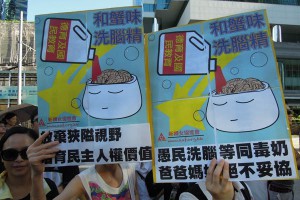
We cannot count on an identical combination of factors repeating themselves today, and therefore any serious strategy to defeat Article 23 must include other contingencies, not street marches alone. What is needed, as with the wider struggle against dictatorship, is a mass movement rooted in the working class majority, in the workplaces and local communities, using methods such as boycott campaigns, occupations and – crucially – the strike weapon. A one-day general strike against Article 23 would represent a massive demonstration of the power of the masses. This would terrify not only the local capitalist elite but also the CCP dictatorship, which would fear such methods being copied by the super-oppressed working class of China.
Tactics for the struggle
As part of the struggle to defeat Article 23, the LSD has pledged that its legislators in the new Legco are prepared to resign and force simultaneous byelections, as happened in 2010. This is an initiative that needs to be considered as part of a wider strategy for mass mobilisation against the new law, while also recognising that many new factors will need to be weighed before adopting such a tactic. Marxists who subsequently formed Socialist Action played an active part in the 2010 byelection campaign.
It is extremely significant that the LSD leaders are now again raising this idea because this reflects a sea change in attitudes. Unlike our organisation, many others – including some LSD activists – became disheartened by the relatively low turnout in the 2010 ‘de facto referendum’. In our opinion, these mistaken conclusions played an important part, although this was not consciously expressed, in the 2011 split into two groupings – People Power and LSD. In contrast, Socialist Action argued at the time that the 500,000 anti-government votes in 2010 represented a very significant achievement – to be built upon.
The call of the LSD for resignations and a new ‘referendum’ against Article 23, reflects important shifts in the mood of society. This is shown by the rising tide of street protests, but also in the huge support generated by the Legco filibuster (against the new byelection law) organised by People Power legislators, Wong Yuk-man and Albert Chan Wai-yip, together with ‘Long Hair’ of the LSD. The filibuster campaign marked a significant turning point because the majority of ‘moderate’ pan democratic legislators were forced by the pressure of public opinion to change their position and begrudgingly support this initiative of the ‘radicals’.
People Power has been even more successful in recent months in mobilising significant numbers in protest. It has won support on the streets and among youth who have a furious hatred of the establishment and the ‘pseudo democrats’ of the Democratic Party, and puts forward a programme not so different from LSD. But despite some impressive mobilisations, People Power is not organised as a party with democratic membership structures and is dominated by a few leading personalities. These factors, and its connections to ‘pan blue’ bourgeois nationalism (although this does not feature in its public message), limit the possibilities for People Power to be radicalised and pushed to the left, or to develop as a vehicle for mass struggle.
Need for a workers’ party
These examples, however, shows that Legco seats – used as a platform for mobilising the masses – can be an important component of the struggle. This is especially the case when a working class party with a clear socialist political message is successful in winning such seats. Socialist Action has never adopted the crude anti-parliamentarism of anarchists and some other left groupings; we understand the importance of utilising elected positions as a means to raise consciousness and initiate struggle. But as we also pointed out during the 2010 campaign, the number of votes (and this applies to byelections and referenda) is not the be all and end all. Other criteria, such as the degree of success in mobilising and organising outside ‘parliament’ are of greater importance.
While parliamentary and electoral tactics can at times play a crucial role, what is more fundamental is the role played by the working class through its own independent organisations and, not least, the use of the strike weapon. While at present workers’ organisations are weak in Hong Kong (and more so in China) for historical reasons, the coming struggles will inevitably see a process of ‘catch up’, through which working class organisations – unions and a workers’ party – become a powerful factor in politics.
Socialist Action works to prepare and hasten this process, fighting for the creation of a mass workers’ party led by representatives who live on an ordinary workers’ wage. By a mass workers’ party we mean something very different from the Labour Party launched by HKCTU chairperson Lee Cheuk-yan earlier this year. This new party models itself on ‘New Labour’ in Britain, a party that has irrevocably cut its links with the working class. Rather than aiming to engage in and lead struggle, the new Labour Party has sought to distance itself from ‘radical protesters’ and therefore in our opinion it is likely to remain a political platform for a few centre-left leaders, rather than become a real vehicle for working class struggle.
In this election we urge support for the LSD, the party that represents the most radical challenge to the government and pro-government parties. The LSD stands for a series of social reforms, opposition to privatisation and struggle for democratic rights – policies that socialists also fight for. But in our opinion these policies do not go far enough because they do not outline the need for a break with capitalism.
Socialist Action stands for a clear socialist alternative, with the banks and major companies that rule Hong Kong brought under democratic public ownership. While we cooperate closely in many campaigns together with the activists of LSD, we also point out the need for a workers’ party, with an active mass membership, as the only force that can defeat the dictatorship and change society. This is why we say vote for the LSD on September 9, but don’t leave matters there. Join the struggle for a socialist alternative – join Socialist Action!

